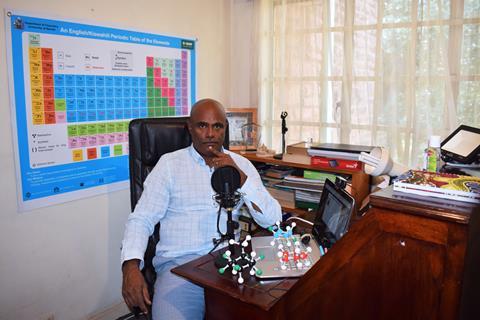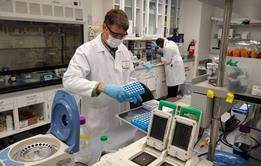With a curfew in place across Kenya, one senior lecturer is spending his nights recording online classes
During this difficult time, Chemistry World is checking in with chemists around the globe to see how they are weathering the Covid-19 pandemic.

‘We were psychologically prepared because we knew for sure it was coming,’ says organic chemist Solomon Derese about the coronavirus lockdown measures that shut down his institution, the University of Nairobi in Kenya. In mid-March, students were preparing for their final exams. Within a few days, they had to pack their things and vacate their dorms as social distancing measures closed campuses nationwide.
Kenya, which has seen 355 confirmed Covid-19 cases and 14 deaths, introduced a curfew from 7pm to 5am in late March. Leaving one’s house is only allowed for essential trips, like buying food. ‘And even if go outside, there’s nothing much you can do,’ Derese says. ‘All the restaurants are closed and you can’t meet anyone.’
Learning to teach online
Most of Derese’s time is now taken up with creating online lectures and preparing his students for their exams. His university uses their in-house e-class system as well as Google Classroom.
But teaching online ‘requires a totally different set of skills’, Derese says. Not only did he realise he had to prepare an entirely new set of presentations and lecture notes, he also had to get used to talking to a virtual audience. ‘When recording a video lecture, you’re just talking to yourself, in your room, alone. You can’t look at your student, see whether they are following you. And sometimes I get distracted, I hear a noise, the dogs barking, things like that.’
‘Preparing a video lecture is like producing a movie,’ continues Derese. He converted his study into an online lecture theatre, complete with professional microphone, webcam, lights and a Kiswahili/English periodic table he created last year – for the International Year of the Periodic Table – stuck to the wall.
Derese goes to great lengths to make sure his video lectures are perfect. He mostly records late at night, when the house is quiet. ‘I try to sleep for a bit around six in the evening and then wake up around 10pm, so I’m fresh for the lectures,’ he explains.
Having a script before starting to record is important, Derese stresses. And afterwards, it’s a lot of editing work. ‘I spend almost two days on a lecture of about one hour. I think personally, I’ve not been this busy in a long time,’ he laughs.
However, doing online classes also has its upsides. Derese says he enjoys having more time than his usual two hours to expand upon concepts. ‘I have really taken my time to explain things in detail, trying not to assume any knowledge and trying to anticipate what students might ask.’
Overall, students’ feedback has been very positive. ‘It has encouraged me to work on my materials and has given me the energy to keep going,’ Derese says.
Exam challenges
But a big question remains. ‘How can you conduct a credible exam online?’ Derese wonders. 70% of each student’s marks come from the final written exam. ‘It’s a challenge, something we have never thought about before. We’re just working out formalities. The plan is to be done with teaching in early May and do the exams in mid-May.’
Some students are struggling to follow online classes, either because they don’t have a stable internet connection at their home or because they find it difficult to pay for data packages, Derese says. ‘One gigabyte of data in Kenya costs about $3–4 [£2.40–3.20], which for many students is a lot. The university is now working with one of the telecom companies in Kenya to provide students with data packages for attending their online classes.’
Lab in lockdown
Derese also had to close his own lab in which he conducts natural product chemistry and computer-aided drug design. ‘Fortunately, three of my four PhD students have already finished their lab work,’ he says. While they are writing up their theses, his two Master’s students are focusing on the computational parts of their projects. ‘Some of my students – the ones that happen to be in Nairobi – still access the lab, not to do wet chemistry but to go to the computer room,’ Derese says.
The team stays in touch mostly through phone calls and emails. ‘Three of my students went back home to Uganda. I asked them if we could do video calls, but they have difficulty with data, and I don’t want to put them under a lot of pressure.’
With no end to the lockdown in sight, Derese expects that several of his students will have to conduct their thesis defences remotely. ‘The university has set up an online presentation system, so if the student has the necessary facilities they can do it from home,’ he explains. ‘Or the student can come to the institution to give their presentation, but the examiners will call in from home.’
Long-term benefits
Derese says that despite the challenges, the experience has taught him to think outside the box. It might even influence how he structures his teaching in the future. ‘I’ve always really wanted to use the time we have in face-to-face classes for discussions, and have basic knowledge covered in a video the student can watch beforehand.’
To keep his students engaged and happy, ‘I asked them to tell me something they have learned during the lockdown’, Derese says. ‘For example, they now have time to catch up on a topic they didn’t really grasp during the previous semester.’ He also encourages students to register for one of the many free online courses. ‘It could be coding, it could be web design. Something they would not have done otherwise.’
Chemists amid coronavirus

How chemists around the world are coping with life and work during the Covid-19 pandemic
- 1
- 2
- 3
- 4
- 5
- 6
- 7
- 8
- 9
- 10
- 11
- 12
- 13
- 14
 Currently
reading
Currently
reading
Chemists amid coronavirus: Solomon Derese
- 16
- 17
- 18
- 19
- 20
- 21
- 22
- 23
- 24
- 25
- 26
- 27
- 28
- 29
- 30
- 31
- 32
- 33
- 34
- 35
- 36
- 37
- 38
- 39
- 40



























































































No comments yet